If recent history is anything to go by then the next Champions League winner will emerge from the semifinal between Bayern Munich and Barcelona.
In the last four years, either of these teams has reached the final twice (Bayern Munich 2010, 2012; Barcelona 2009; 2011). Nevertheless, their respective fortunes couldn’t be more contrasting. Whereas the Blaugrana have won their two Champions League finals, Bayern Munich lost theirs.
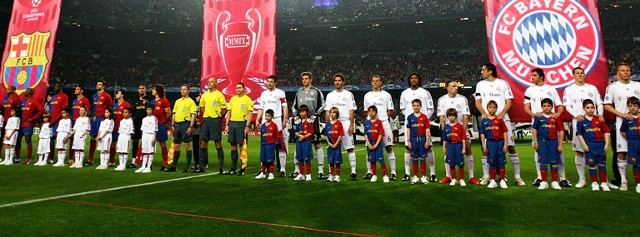
Coincidentally, the Bavarians both times lost out to the conquerors of Barcelona at semifinal stage (Inter Milan in 2010, and Chelsea in 2012). Barcelona on the other hand has yet to lose a Champions League final in the new millennium.
While their recent success (or lack thereof) in Europe is incomparable – after all, history remembers the winners not also-rans – both these behemoths of European football are quite similar, from a sporting perspective at the very least.
In addition to being the, or one of the main contenders for all domestic honors, both sides have won Europe’s biggest club football prize four times. This year the pair has also recaptured the domestic title from their nearest rivals, Real Madrid and Borussia Dortmund.
Although in Barcelona’s case it’s not officially confirmed yet, it’s only a matter of when, not if.
Then there’s the personnel that goes by the name of Pep Guardiola. After winning 14 out of 19 possible titles with Barcelona during his four-year stay with the La Liga giants, the former Blaugrana player opted to take a sabbatical year once the 2011/12 season had concluded.
Sought-out by many of Europe’s richest clubs to become their next manager, Guardiola surprised many when Bayern Munich announced in December 2012 that the Catalan has signed a three-year deal that would begin July 2013 and run through June 2016.
To be perfectly clear, Bayern Munich is anything but poor. But while the Bundesliga side lacks a sugar-daddy benefactor a la Roman Abramovich, or Sheik Mansour, the Bavarian outfit has the financial muscle to compete with anyone in the transfer market (Barcelona included).
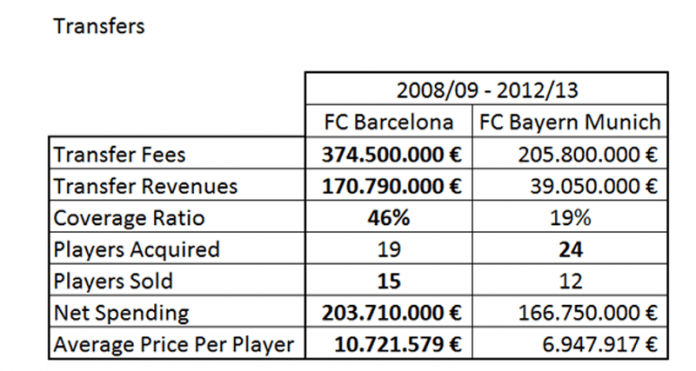
Since Pep Guardiola first took reins over Barcelona, his previous and future employers have spent vast amount of money on new players. The table above offers a better, although somewhat limited insight into the transfer policy of both clubs.
The Catalan side has spent almost double the outlay on new signings than their Bavarian counterparts, €374 million to €205.8 million, but Barcelona also has a higher coverage ratio at 46% to Bayern’s 19%. Though FC Hollywood’s net expenditure of €166.7 million almost rivals Barcelona’s €203.7 million, it isn’t necessarily proof of frivolous spending on behalf of Die Roten.
Unlike Barcelona whose transfer policy is often times influenced by their off-pitch rivalry with Real Madrid, that causes the Catalan club to sanction unnecessary, or highly expensive acquisitions (sometimes both), Bayern Munich don’t spent money on vanity signings.
The consecutive summers of 2009 and 2010 are prime examples for Barcelona’s illogical approach in the transfer market.
FC Barcelona’s treble success in the 2008/09 campaign prompted the re-elected Real Madrid President Florentino Perez to pay a little more than a quarter of a billion Euros on new players in the same summer, amongst those players, a certain Cristiano Ronaldo, at a massive €94 million price-tag.
Never the ones to be outdone, the Blaugrana felt inclined to buy Inter Milan’s Zlatan Ibrahimovic for an equally mind-blowing €49 million in cash, plus Samuel Eto’o who Barcelona valued at €20 million.
Cristiano Ronaldo is still at Real Madrid, whereas Zlatan Ibrahimovic is now plying his trade in France’s Ligue 1 at nouveau riche PSG (by way of AC Milan).
For various reasons (sporting and otherwise) the Swede only lasted one season, once more forcing Barcelona to enter the transfer market in search for a superstar acquisition – Valencia’s David Villa for €40 million.
Interestingly enough, €45 million would’ve been enough to persuade Valencia’s president to part with his prized asset a year earlier. According to reports then-president Joan Laporta refused to raise his offer of €40 million for El Guaje.
Barcelona has effectively spent €89 million (excluding wages and signing bonuses) to replace Samuel Eto’o. Even worse, David Villa’s days in Barcelona appear to be numbered, meaning another vanity signing is required.
Worse still, Barcelona is not likely to recoup a significant amount of their investment for the now 31 year old forward.
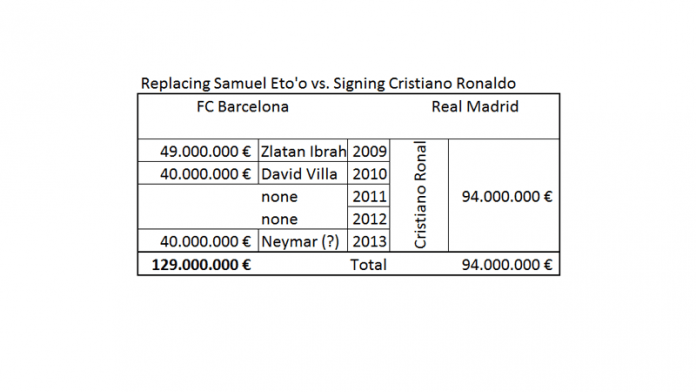
Bottom line: Barcelona has yet to find an adequate replacement for Samuel Eto’o. If Barcelona does indeed buy Brazilian It-Boy Neymar this summer, he’ll likely command a transfer fee north of €40 million.
With David Villa all but certain to depart the Blaugrana at the end of this current season, it’ll add to the Samuel Eto’o replacement cost, reaching in excess of €100 million.
In light of the staggering, and mounting costs of replacing the legendary Cameroonian, it makes the record-breaking €94 million Madrid paid for Cristiano Ronaldo look like a sound investment.
Even more so since Los Blancos can arguably still demand his original price-tag from potential suitors. After all, he just turned 28 in February; the exact same age Ibrahimovic and Villa were when they joined Barcelona in a big-money transfer.
Somewhat lost in the mix has been the 2009 transfer of Arjen Robben to Bayern Munich, facilitated in no small part by Florentino Perez’ requirement for cash-flow to fund his transfer extravaganza that summer.
Although by no means a cut-price deal, the €25 million Bayern Munich paid for Robben can be considered a bargain, especially in hugely inflated transfer market. He was, and still is a key performer for Bayern Munich.
Whereas Barcelona’s 2009 signings are nowhere to be found these days, Bayern Munich can still rely on the services of Robben and Mario Gomez, who also arrived in the Bavarian capital around the same time as the Dutchman.
There’s the concept that not all players are cut out for Barcelona’s football philosophy. But while the influx of La Masia talent in the Catalan first team is supporting this idea, it further establishes the notion that Barcelona’s scouting and signing policy are abysmal.
Since 2003 Barcelona have had a total of three managers (Vilanova included), two from 2008 onwards. Since Pep Guardiola was installed as Barcelona’s manager, the club has bought 19 players but only retained 4 (21%). Bayern Munich have signed 24 players yet have retained 12 (50%) of their signings.
Shouldn’t it be easier to identify transfer targets? Especially with a tried, tested and not altered football philosophy in place? Bayern had a variety of managers over the seasons, but how come they have a higher retention rate in that regard? Moreover, why does Bayern Munich has the better performing attackers?
The table below illustrates how Barcelona’s attacking signings compare to Bayern Munich’s forwards.
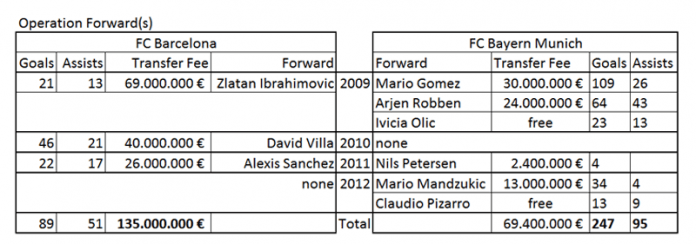
The Blaugrana have spent almost twice the amount on forwards, but only received about a third of the contribution of Bayern Munich’s signings in return. It once again raises the question: “Why is Barcelona’s administration incapable of identifying the proper forwards that would enhance their attack significantly?”
It’s really mystifying that a team that has played with a particular system for so long is unable to purchase the right player. Conversely, it highlights Bayern Munich’s technical staff’s ability to identify and sign the players the need, at reasonable prices.
The fact that Arjen Robben and Mario Gomez are still with FC Hollywood is a testimony to their quality.
Sure, the Bavarians did lose both of their recent Champions League finals, but then again, would Barcelona even have reached the finals without the contributions of Lionel Messi, let alone win?
Barcelona’s negligence to buy a proven, natural centre-back has further weakened an already fragile defense. Almost all of their domestic rivals have managed to beat Victor Valdes at least once.
In a league where the financial disparity is greater than in any other of Europe’s top 5 championships, it speaks volumes of the Catalans defense when even bottom dwellers Celta Vigo, who spent a net €3 million on new recruits, can score two goals against Barcelona.
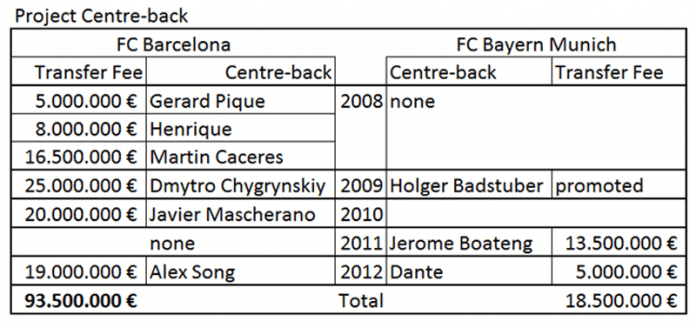
From 2008 onwards, Barcelona has spent €93,5 million on centre-backs, or defensive midfielder with the intention of retraining them into ones. Out of the 6 players the Blaugrana signed, only the cheapest, Gerard Pique, has firmly established himself as a starter.
Furthermore, the Catalan club seems to be hell-bent on proving that they don’t require natural centre-backs.
One of the more ridiculous signings in recent Barcelona history is Alex Song from Arsenal for a staggering €19 million. Signed as a 2-in-1 centre-back/defensive midfielder combination, the Cameroonian has been horrendous in central defense, and only features in midfield these days, if he plays at all.
While Barcelona faithful bemoan the ‘limited’ transfer funds Barcelona has available to them (still a respectable €50 million), one should consider that the very same institution paid €39 million buying two defensive midfielders to address one problematic position – central defense.
Though Javier Mascherano’s transformation has been somewhat successful, he’s still not quite at the level to keep the likes of Cristiano Ronaldo & Co. at bay.
It’s mildly amusing hearing Barcelona’s president, Sandro Rossell, preaching financial austerity, when he’s paying two players (Mascherano and Song) for half a position, as neither is a guaranteed starter in defensive midfield, or central defense for that matter.
Bayern Munich bought two centre-backs (Jerome Boateng and Dante) for a combined €18.5 million. Furthermore, they promoted and successfully integrated Holger Badstuber to the first team a couple of years prior to their arrival. The outlay for Boateng and Dante is less than a quarter Barcelona paid for their options at central defense.
More interestingly though, each of them is a full international (Boateng and Badstuber represent Germany, Dante just recently made the grade at Brazil). Unsurprisingly, the German Champions-elect boast the best defensive record in Europe, conceding just 14 goals in the Bundesliga.
Barcelona has a world-class team, with the exception of central defense it’s a match for any side in the world, perhaps superior to most of them. Unfortunately, Barca’s front office is anything but world-class. Although they did make a few solid, if not inspired signings (Dani Alves, Gerard Pique, Javier Mascherano, and more recently, Jordi Alba), they are few and far in between.
Not to mention, Barcelona’s misfits were utterly expensive. While the bulk of transfer failures can be attributed to the previous administration, Sandro Rossell is at risk of repeating the same mistakes his predecessor made, prioritizing unnecessary vanity signings.
The Catalan club prides themselves on their golden generation of La Masia players, and rightfully so. But while Barcelona football team is world-class, its organization, particular the department responsible for scouting and signing new players is substandard.
Bayern Munich not only took a cue from Barcelona, they signed Pep Guardiola to a three year deal. Perhaps Barcelona should follow suit and emulate Bayern Munich’s administration when it comes to conducting (transfer) business.
You can follow the author of this article, Sebastian on Twitter @JubeiKibagame.
Add Sportslens to your Google News Feed!